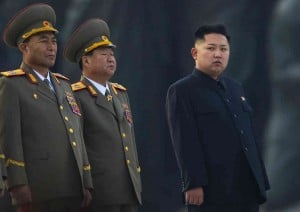
Talk to them? How?
Whatever the impact of a new national security team, and whether or not President Trump actually meets with Kim Jong Un in the next few months, the fundamental problems with North Korea remain the same. Former U.S. negotiator Evans Revere notes that we have heard Kim’s line before. Still, the atmospherics around around the question are changing, and an unnecessarily negative response risks painting the U.S. as the belligerent party.
U.S. diplomacy might introduce a new note to the discourse with a two-part message. This would start with a fantasy scenario: If somehow North Korea became a state that served its public, our drive to isolate them would start to weaken, South Korea’s fears would abate, and the international community would find dealing with the Kim dynasty less distasteful. Such development of their regime into a responsible state would reduce tensions and make nuclear weapons less important, to them and so to us, whether or not they keep them.
Of course we know full well that North Korea will remain a brutal dictatorship, that its strategic aim has long been to take over the whole peninsula. The purported diplomatic opening is most likely a stratagem or outright ruse.
So the second part of the message would point out the fragility of North Korea’s regime. With or without their nukes, it will be destroyed in any war, probably with a nasty death for Kim Jong Un himself, leaving only the question of how many others are killed in the process.
We should remind Kim that the nature of his dynasty supports our case for economic sanctions, and will help us to isolate them further. We have not mounted a campaign to undermine the dynasty, heinous as it is. But even if the nuclear question is somehow resolved, their brutality and belligerence will still be known; they will remain isolated, with or without nuclear weapons.
This reminder should invoke our half-century military deterrence of the Soviet Union, a much more powerful regime, and how its own tyranny killed it from within. The price for keeping their nuclear program is our concerted effort to inflict costs like those that hastened the Soviet collapse. We may lack the capacity to force North Korea to give up its weapons now, but the regime’s best guarantee of survival is to reduce their repugnance.
We don’t really know what drives former-Swiss-student Kim Jong Un, or any North Korean. In any case, just as rejecting an invitation to dialogue risks making us look belligerent, raising the fantasy scenario clarifies our true motive, to protect free people and advocate freedom. The simple observations of this message suggest a positive long-run possibility while ceding nothing. They are not a negotiating agenda, so raise no questions of reducing our military exercises. They do remind all that North Korea does have another option to ensure their security, however difficult; the onus of rejecting it falls on them.
Kim would have to craft a response. In a world that knows his regime’s tyrannical nature, he would either have to cut its weapons program, initiate real measures to liberalize, or admit to a disdain for any standard of decent government. The regime likely won’t bother with the fantasy scenario, and keep discourse in its current traces. But if somehow they pick up the idea, there may be some basis, over time, for reducing tension and fear.
The message can be transmitted by a President. But the idea cannot be implemented by negotiations in the near term. North Korea’s history does not justify any tradeoff of commitments, to reduce sanctions on our side in exchange for certain policies on theirs. We could not, and should not offer, to tell them how to be more free — which could be taken as imposing our interests. But if the world sees basic commitments to rights, in unfettered views of their society, negotiating anything would become easier.
The idea of course carries risks. One is that North Korea makes enough cosmetic change to loosen South Korean resolve. The South Korean left has pursued conciliatory gestures for political purposes in the past, witness the cash-for-meetings to the north that yielded Kim Dae Jung a Nobel Peace Prize. Another risk is that our other policies worldwide fail to convey the priority we put on freedom and peace. But if credibility in tough talk to North Korea makes us tighten our self discipline, it’s good for America.
Furthermore, the proposed message should resonate for an America aching to revive its moral authority. We are most influential when we project our core nature. Should we move North Korea either to cut its nuclear program or evolve toward responsible governance, so much the better. Nothing else seems to be working.